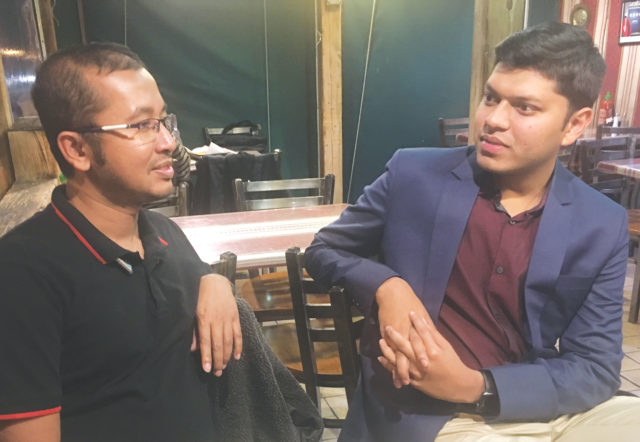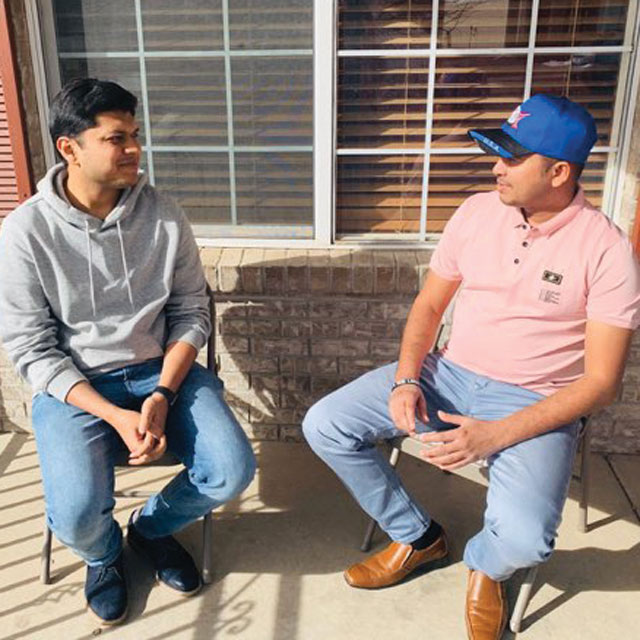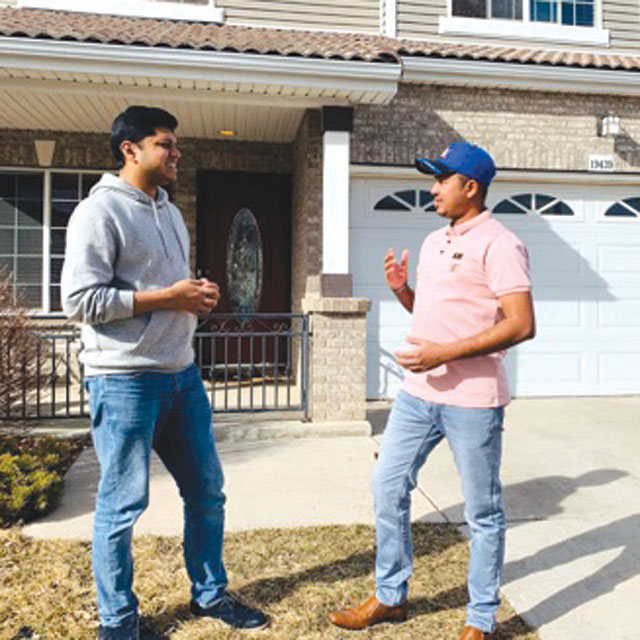
As Rezwan Masud walked toward the waiting train, he heard someone come up behind him. Before he could turn, hands covered his eyes. He was startled, unsure of who it could be. After all, hardly anyone knew he was back in the U.S.
Rezwan had taken the train in search of halal meat to make a home-cooked meal in his new house in Boulder. The best place he knew was in Aurora, a few hours journey on public transportation just for a taste of home.
On the platform, he finally heard the memorable laugh of Shoeb Iqbual, and it made him smile.
He turned to see his friend and fellow Bangladeshi staring back at him. Shoeb chastised him for not telling him he was back — he would have picked him up from the airport, taken him to a welcome home meal at his favorite Indian restaurant, driven him to Boulder, done what he could to help.
He’d been back a few weeks already, Rezwan explained, sharing how quickly everything came together after his student visa was finally approved. It was months of waiting in Bangladesh, filled with anxiety, as he deferred the start of his PhD program in comparative politics and political theory at the University of Colorado by a semester, and then another.
But all that frustration was now behind him. He was back.
Shoeb offered to take him to his favorite Bangladeshi store, promising the best halal meat in the Denver area. Then he took Rezwan to his new house, cooked them food and the two spent hours catching up about all that had taken place in the last year.
At first glance, Rezwan and Shoeb have a lot in common. Born only a few years apart, they’re both from Bangladesh, both practicing Muslims, and both immigrated to Colorado in search of opportunity. But in most ways, their stories couldn’t be more different. Whereas Shoeb fled Bangladesh facing political persecution and was held in immigration detention for more than two years, Rezwan first came to Colorado as a Fulbright Scholar studying political science. Shoeb is passionate, a fast talker who easily shares his opinions. Rezwan is more reserved, often waiting to share his thoughts until he’s asked, slow to articulate the depth of his ideas.
While Rezwan was confined to Bangladesh, forced to reimagine his future without the U.S. doctorate he’d always expected to receive, Shoeb had quit his job as a wheelchair attendant at the airport and now is a full-time labor-rights activist and union organizer.
As Rezwan taught political science at a university back home waiting for his visa to come through, Shoeb finally received his permanent residency in the U.S.
They were first introduced as part of a research project for a qualitative methods class during Rezwan’s last semester of graduate school at the University of Denver’s Korbel School of International Relations. As part of that research, Shoeb shared his first-hand experience of the asylum process and time in immigration detention, (See News: “Opposite of America,” Feb. 18, 2016.)
But now, being in Shoeb’s house, meeting his friends, Rezwan was amazed at how much had changed since he first met his friend.
“When I saw that he has a home now, and he has beautifully decorated his room, it was really nice,” Rezwan says. “When I interviewed him and I heard his story, I didn’t imagine [this was possible].”
• • • •

The two met in April 2018, at an anniversary celebration for Casa de Paz, a nonprofit offering short-term housing to recently released detainees and visiting family members near the Aurora Contract Detention Center, operated by the private-prison company GEO Group, Inc.
It was the first of many visits Rezwan made to Casa de Paz to research and interview formally detained individuals. In his research notes, he described a warm and welcoming environment that first night, with people from all over the world gathering to celebrate. On a brief tour, he noticed a comment wall describing former detainees’ experiences inside the detention center full of “exaggerations and simplistic generalizations,” he reflected in his class notes. One comment in particular caught his eye.
“The dominant party is killing people in Bangladesh.”
Rezwan was immediately skeptical. “Seriously,” Rezwan thought to himself. “It was very surprising to me that someone could come this far.”
Did someone really travel from Bangladesh to claim asylum? Who was this person claiming such things?
Sarah Jackson, the executive director at Casa de Paz, explained that one of their guests was from Bangladesh, and he often participated in the university’s research projects. He’d spent two and a half years in detention before finally winning asylum in early 2017, Jackson told Rezwan.
“When I first heard about him, claiming asylum, I thought maybe he did something really wrong in Bangladesh and maybe he was taking advantage of the opportunities of coming to the United States,” Rezwan admits.
When Rezwan took the assignment, he assumed he’d be interviewing research subjects from south of the border, using interpreters to communicate between English and Spanish. He never expected to interview someone in his own language, from his own country.
Rezwan met Shoeb, or research subject No. 22, later that evening, full of suspicion. Did he really suffer in Bangladesh or on his journey to the U.S. southern border or in detention? Could he be trusted?
“Even if one tells lies (not that anyone was lying), can I discard his/her sufferings?” he wrote in his research. “The experience of that day made me realize they are also human beings with a fallible mind and body that understands pain and sufferings. After this realization, I think I would be more cautious in evaluating the sufferings of human beings. I came home with the earnest desire to listen to 22’s story in detail.”
Shoeb was equally surprised to find a fellow Bangledeshi in that context, someone who understood where he was coming from in a completely different way than his fellow detainees.
He’d talked to researchers from the university before, but none of them were from South Asia; none of them spoke his language.
“There’s no one from Bangladesh or India or Nepal,” he says. “I never expected Rezwan was going to be there.”
“It was unbelievable,” Rezwan says of the hour-long interview he had with Shoeb soon after.
“I felt similar [about] the stories of other people as well, but his helped me transform my views more because the extent of what was happening at my doorstep was something that I was unaware of,” he says. “Maybe it was like a blind spot.”
Growing up, Rezwan’s family was not involved in politics. As a government servant, his father’s job security depended on neutrality as shifts in power occurred fairly regularly. Plus, “Being a member of a political party is not a very safe thing,” in Bangladesh he says. “It has its costs and opportunities, but I didn’t want to get involved in that.”
“when human lives are at stake, political beliefs should not be the primary consideration.”
Rezwan Masud
From a middle-class family, Rezwan grew up in Sylhet in northeastern Bangladesh but ended up in the capital studying political science, choosing to examine the theoretical underpinnings of the political system instead of engaging in it specifically.
Shoeb, on the other hand, was deeply connected to local politics, joining the Bangladesh National Party (BNP) as a university student in Noakhali, a Southern district of the country. But the BNP lost power in 2006, quickly becoming “the opposition party,” and Shoeb moved to Singapore and Malaysia for several years. He returned in 2014 in preparation for the parliamentary election, which quickly led to violent protests and mass arrests of BNP members. Shoeb fled Bangladesh soon after, as his business was ransacked, he was chased at gunpoint and his family threatened for his work recruiting new BNP members.
Rezwan admits his own naivete surrounding these elections. He knew there were political protests and he knew BNP members and supporters were being arrested. But he thought they deserved it for inciting violence, causing undue suffering to common people. He had no idea the reality of Shoeb’s last few years back home in Bangladesh.
“For me political violence, protests, arrests — those were statistics,” Rezwan says. “But after interviewing him, I was exposed to a more humane experience… I did not anticipate the level of threat that one could actually feel because of those things. That’s what was actually surprising to me.”
What was more shocking for Rezwan was Shoeb’s resilience in the face of so much suffering — not just what he experienced in Bangladesh, but also all along his journey to the U.S.
“I had no idea about this,” Rezwan says. “To come to the Texas border, he had been through jungles in Panama, he had been through marshes in Colombia and arrested in Mexico.”
“When I saw the American flag, I forgot all my sufferings and miseries. I felt like I was one step away from embracing freedom,” Shoeb told Rezwan in his research interview. But that optimism soon turned to despair, as Shoeb was taken into immigration detention after claiming asylum.
In his interview with Rezwan, Shoeb described his treatment in a variety of detention centers like torture — freezing temperatures, breakfast served at 4:30 a.m., being paid $1 a day for working in the kitchen for nine hours. He described sleepless nights spent crying over his situation, missing his family back home, his dreams of a better future dashed. His mother passed away at age 49, one month before his release. Overall he spent two and a half years in detention, as his asylum case made its way through immigration and appellate courts. His release was a mixture of hope and uncertainty, his view of America irrevocably altered.
“However, I do not hold the same opinion about America and freedom,” he told Rezwan. “Life is not easy here. We are not criminals, but we were treated like criminals. We faced unnecessary harassments. Valuable time of my life was lost. I never spent time in jail before, but the two and half years that I spent inside the detention center changed my perception about the system of this country. There is no humanity. They talk about human rights, reality is totally opposite.”
What Shoeb, and the other research subjects, shared about life in detention was equally horrifying for Rezwan, who previously had believed the information on the GEO Group’s website about protecting the dignity of detainees.
“The reality is very different,” he says. In his field notes, he often describes tearing up at the stories he heard, finding it difficult to continue with his interviews. But by far, Shoeb’s was the most challenging interview of his research, as it challenged his view of America, his perception of Bangladesh and his own situation.
“The interview made me question my positionality,” he wrote in his field diary for class. “It made me realize that I am a privileged person. When I was taking notes and hearing about the description, it made me assess the situation of Bangladesh differently. … The interview has made me understand that when human lives are at stake, political beliefs should not be the primary consideration.”
But Rezwan remains politically neutral in his conversations with Shoeb, stopping short of sympathizing with Shoeb’s political causes. Rezwan describes himself as an internationalist, not bound to human affection based on borders and patriotism, and he denies any sort of affection for Shoeb based on the fact they are from the same place.
Still, after that first interview, the two exchanged numbers and quickly formed a friendship. They began to talk more often, and Rezwan invited Shoeb to political lectures at his school while Shoeb invited Rezwan to protests outside the detention center.
A person isn’t just what he thinks, Rezwan says, easily detaching his friend Shoeb from the political activist Shoeb.
• • • •

Now that Rezwan is back in Colorado, the two continue to develop a relationship over meals and shared experience, while consistently acknowledging how different their personalities and backgrounds really are.
“My life has changed a lot in the last few years, especially after I came to this country. My mom died, I was in jail for so long,” Shoeb says. “But Rezwan came here to study, his mentality is totally different. He’s going to do his PhD, go home, get a good job and have a family.
“And my plan, I’m going to become a citizen someday, and vote, maybe run for office.”
In the meantime, they invite each other to events often — Shoeb, well connected to the couple hundred other Bangladeshis who have recently settled in the metro area, Rezwan, full of academic connections and invites to international lectures.
On a day last fall, we met at the library at the University of Denver, Shoeb asking for a tour of Rezwan’s former school. Rezwan is tall and lanky, walking slowly as we talk. Shoeb is portly and animated, fast-talking and bouncing around.
People seem to recognize Rezwan, former classmates approaching us just to say hi. Later, while we’re at a nearby restaurant, a friend sees him from her car at a red light, honks and frantically waves. Shoeb is excited to see more of Rezwan’s life, as the two rarely have time to meet up as Rezwan’s studies and Shoeb’s work keeps them both busy. They often talk over the phone on the weekends, however, when they both have a bit more time to catch up.
The two say it’s mostly chit chat, void of work or study or anything else that would bring up the stress of daily life.
“Plus, I study political science and no one wants to hear about that,” Rezwan adds.
Shoeb disagrees, though, and despite their attempts at keeping politics out of the conversation, it often manages to creep back in.
“I do like politics a lot, I hope to be a politician at some point,” Shoeb says as Rezwan’s eyes get big and his brow raises.
“We’re so opposite,” Rezwan says, laughing. Here or back in Bangladesh, he asks, with a hint of sarcasm.
“Here, not in Bangladesh for sure,” Shoeb says. “Here also needs a lot of changes.”
Rezwan smiles, shaking his head, “American dream.”
“I’m very adverse to power because political philosophy and power do not go together,” he adds.
Shoeb continues talking about the problems of low minimum wage in Colorado and around the country. He talks about the current Democratic presidential candidates and openly criticizes the president’s policies and actions.
“I’m surprised at how boldly you’re expressing yourself,” Rezwan tells Shoeb. “There’s a fearlessness I see in you.”
Shoeb’s zeal for justice can often make Rezwan uncomfortable. When they were on the light rail together a month or so ago, Shoeb confronted a man asking for tickets in the hopes of reselling them for profit. Shoeb told other passengers they could face a substantial fine for giving their tickets away too soon, imploring the man to stop asking.
But Shoeb quickly saw he was being too aggressive for Rezwan and backed off. His stop was next anyway, and the two said goodbye.
“I was scared, he was a big guy,” Rezwan says. “What if he took out a gun?”
“I was just arguing what was right,” Shoeb says, steadfast in his commitment to this approach. “You never know when you’ll die. If you are afraid of dying, and something is happening that is wrong, you just close your eyes? If you have the opportunity to help protect people, I think you have to do it.”
Rezwan nods, then asks Shoeb if he had anything to do with what happened next.
Not five minutes after Shoeb left the train, Rezwan tells him, RTD guards approached the man asking for tickets and eventually kicked him off the train. Rezwan sat there relieved, but also suspecting Shoeb had something to do with it.
“I didn’t know what happened but I just had a hunch it was Shoeb,” he says.
Shoeb confirms it. He had gotten off the train and immediately told the guards, helping to diffuse the situation in a different way. The two friends laugh, as the server brings the check and we all prepare to leave.
“How are you getting back?” Shoeb asks. When Rezwan doesn’t have a good answer, he immediately offers to give him a ride.
Their lives will likely diverge in a couple of years, as Rezwan plans to return home after finishing his degree, while Shoeb may never be able to go back. But for now, the friends leave together.














